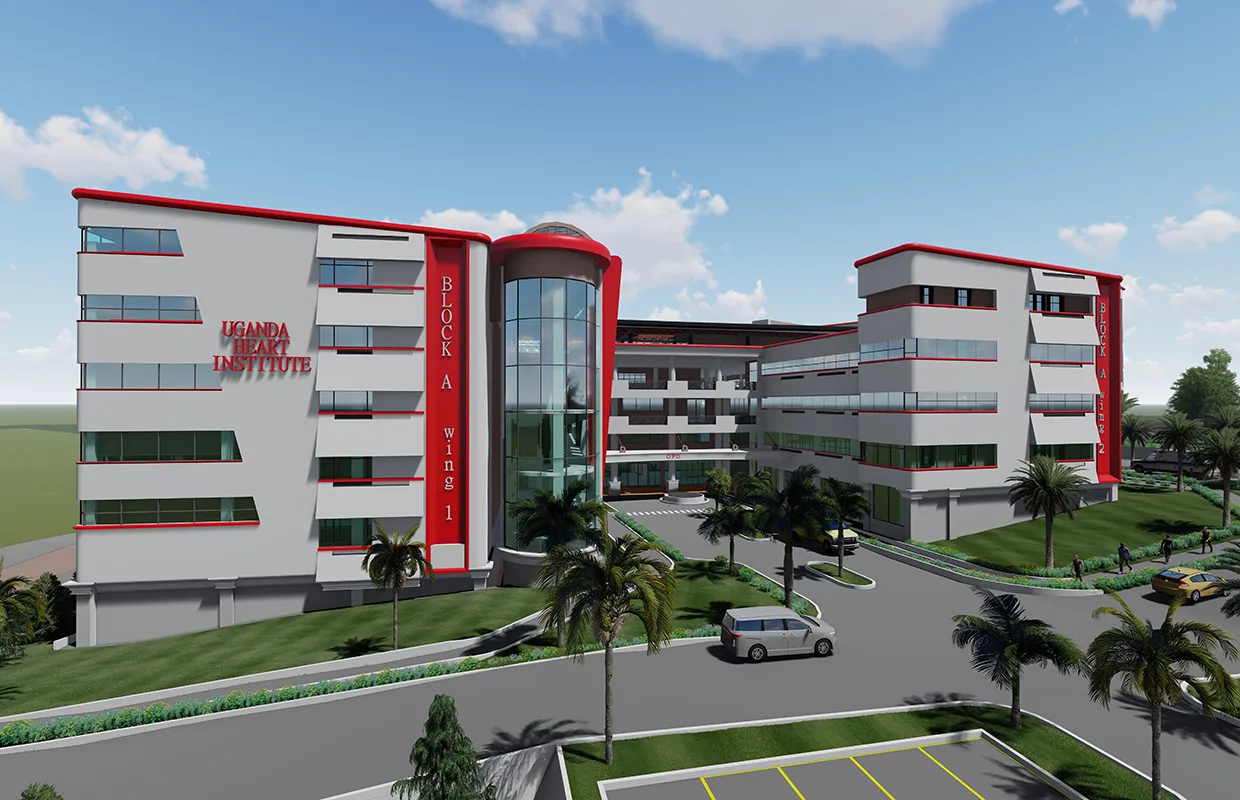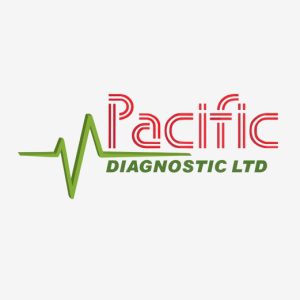The Uganda Heart Institute leads the fight against cardiovascular diseases through innovative research, comprehensive patient care, and a commitment to training the next generation of healthcare professionals. Executive Director, Dr John Omagino, emphasises the remarkable work being accomplished.
COMMITTED TO COMBATTING CARDIAC CONDITIONS
Playing a vital role in the nation’s health, the Uganda Heart Institute (UHI) was established in 1988 and is currently a super-specialised leading provider of cardiovascular services and the only national referral facility for heart diseases in Uganda.
Operating as an autonomous body, mandated by the UHI Act of 2016 to manage and coordinate the country’s efforts in addressing cardiovascular diseases (CVDs), it is overseen by a Board of Directors responsible for carrying out the functions assigned by the act.
“Our vision is to be a global centre of excellence in the provision of cardiovascular care, and our mission is to provide preventive, promotive, and clinical services and conduct research and training in the relevant science,” introduces Dr John Omagino, Executive Director.
UHI has attained the technical capacity to offer a complete range of cardiac services comparable to any centre of excellence in the world. This is for both children and adults, comprising diagnostic, non-invasive, and invasive procedures, intensive care and coronary care services, diagnostic and interventional cardiac catheterisation services, and open heart surgery.
Given the necessary operational adequate funding, UHI can comprehensively handle 95 percent of adult cases, including valve and coronary bypass surgery, plus 85 percent of paediatric cases.
Additionally, it can ably teach and train cardiac super-specialists in the cardiac super speciality and conduct high-calibre research to ensure quality care and generate the necessary data to guide policy, reducing the percentage of people being referred abroad to less than five percent.
“We serve a diverse and growing base of over 25,000 patients annually, drawn from all regions of Uganda and neighbouring countries,” Omagino explains.
UHI currently has a committed team of over 300 staff members, including cardiac critical care, adult and paediatric cardiology, cardiothoracic surgery, cardiac anaesthesia, cardiac nursing, allied and therapeutic professionals, and corporate staff, all working collaboratively to provide world-class cardiovascular care.
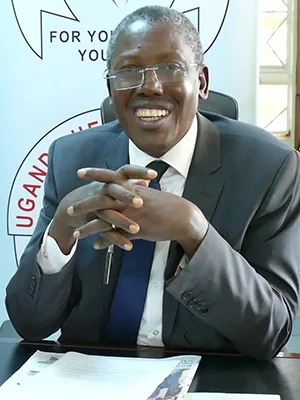
“Our vision is to be a global centre of excellence in the provision of cardiovascular care, and our mission is to provide preventive, promotive, AND CLINICAL services and conduct research and training in the relevant science”
Dr John Omagino, Executive Director, Uganda Heart Institute
ADVANCEMENTS IN RHEUMATIC HEART DISEASE MANAGEMENT
UHI is internationally recognised for its pioneering research on rheumatic heart disease (RHD), a major public health burden in sub-Saharan Africa. It leads several regional and global RHD studies and has contributed to key policy documents that guide prevention and management.
“Our work includes school-based screening programmes, echocardiographic surveillance, and clinical trials on penicillin prophylaxis and surgical outcomes. We also engage in advocacy and health education to raise awareness and reduce the stigma associated with RHD in schools and communities,” Omagino imparts.
Moreover, as a key partner in the Pan-African Society of Cardiology (PASCAR) and RHD Action networks, UHI contributes to the global goal of eradicating the disease by 2030.
Populations affected by RHD are at an increased risk of developing various cardiovascular issues, highlighting the need for early intervention. It’s equally important to note that Uganda is enhancing its capacity to address these challenges.
“This is an exciting time to work in the cardiovascular health space in Uganda. The burden of CVDs is rising rapidly, but so is our national capacity to respond.
“We are seeing stronger government commitment, greater public awareness, and more investment in health infrastructure. Most notably, the construction of our new 250-bed, super-specialised heart hospital in Naguru will be a game-changer for cardiac care in Uganda,” he states emphatically.
UHI is also expanding regional heart centres, regional surgical camps, training programmes, and research collaborations that position Uganda as a leader in Africa.
Of course, challenges remain, particularly in terms of limited specialised personnel and access for underserved populations, but meaningful progress is being made.
“I find this sector incredibly fulfilling because it allows us to save lives, build capacity, and contribute to national development. For young professionals and innovators, this is a powerful space to be in. The potential to make an impact is real, and the future of cardiovascular care in Uganda is bright,” Omagino enthuses.
“The potential to make an impact is real, and the future of cardiovascular care in Uganda is bright”
Dr John Omagino, Executive Director, Uganda Heart Institute

DECENTRALISED HEART CARE REACHING EVERY CORNER OF UGANDA
UHI plays a national coordinating role in Uganda’s national cardiovascular health response, working closely with the Ministry of Health and regional referral hospitals to strengthen the decentralisation of cardiovascular services through outreach programmes, local closed heart surgical camps, and capacity building.
CVDs are a major public health challenge in Uganda, contributing significantly to non-communicable disease mortality. To address this, UHI is establishing 16 regional heart centres to decentralise specialised cardiac care, reduce patient travel burdens, and improve early diagnosis and treatment.
“Phase One is already underway in Mbarara, Hoima, Gulu, Jinja, and Lira, selected and based on key factors such as land availability, proximity to medical institutions, and strategic national importance,” Omagino urges.
Whilst these centres take shape, UHI continues to conduct quarterly outreach visits across all 16 regions, offering screenings, minor procedures, patient treatment and post-surgery follow-up appointments, and training for local healthcare workers.
Furthermore, a new state-of-the-art cardiac facility currently under construction in Naguru will expand access to advanced cardiovascular care and reduce the need for referrals abroad.
“It will more than triple our cardiac surgical capacity from 300 to approximately 1,000 open heart surgeries annually, plus 8,000 to 9,000 interventional cardiology procedures in the two catheterisation labs (cath labs), allowing us to clear backlogs and treat more patients locally.
“This directly reduces the number of high-cost referrals abroad, saving the government and families millions of dollars per year. It will also enable us to increase our training and research capacity; we will build a self-sustaining ecosystem for cardiovascular excellence in Uganda,” Omagino promises.
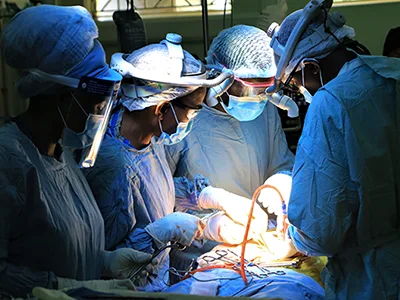
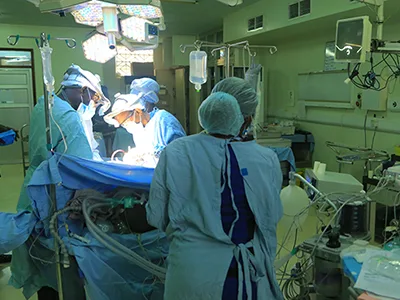
FELLOWSHIP AND TRAINING FOR SPECIALIST CARDIAC CARE
UHI is steadily positioning itself as a destination for medical tourism in cardiovascular care by providing affordable, high-quality services that meet international standards. It has successfully treated patients from South Sudan, Rwanda, Burundi, the Democratic Republic of the Congo (DRC), and beyond the region.
“With our team of highly skilled specialists and state-of-the-art interventions, patients are increasingly choosing UHI as a preferred alternative to expensive overseas referrals. Our vision is to become a regional referral hub for complex cardiovascular procedures,” Omagino reveals.
The, UHI began its in-house training programme in 2010 with three paediatric and adult cardiology fellows. Accredited by the Uganda Medical and Dental Practitioners Council, it has evolved into a comprehensive training hub, producing over 70 specialists across various cardiac disciplines.
In April 2021, UHI held its inaugural graduation ceremony, celebrating 49 fellows trained in multiple cardiac specialities. Its impact now extends beyond Uganda’s borders, having trained medical professionals from countries including the DRC, Liberia, and Somalia.
“We currently offer seven accredited fellowship programmes which include adult cardiology, paediatric cardiology, cardiac surgery, cardiac anaesthesia, cardiac critical care, cardiac nursing, and catheterisation technology. The programmes emphasise clinical excellence, research, mentorship, and leadership in cardiovascular health.
“Previously, specialised training required international travel at a cost of over USD$100,000 per trainee. We deliver comparable, high-quality training locally at just a quarter of that amount, significantly increasing accessibility and sustainability, whilst strengthening Uganda’s national health system and regional capacity,” Omagino closes earnestly.
This approach not only benefits patients locally but also presents an opportunity as the UHI model of establishing a high-quality tertiary centre within a resource-constrained setting, and with government support, can be exported to developing nations.
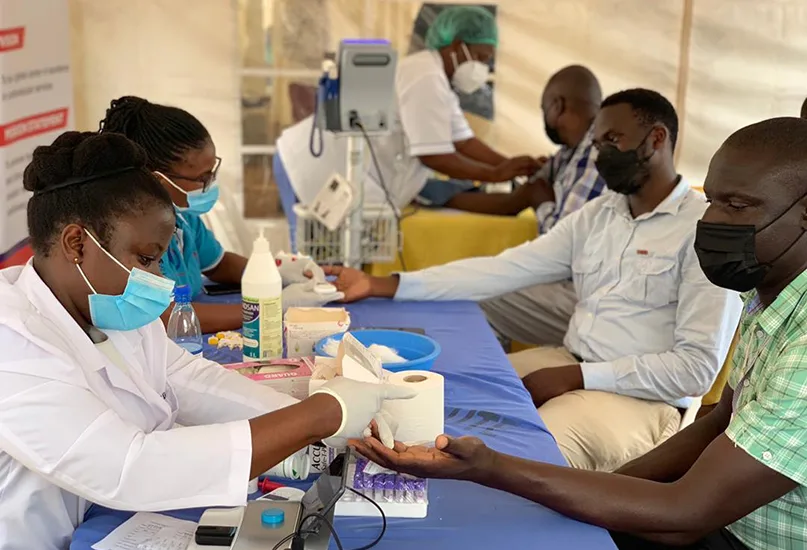
UHI’S NEW HOME
The construction and equipping of UHI’s state-of-the-art hospital in Naguru is a flagship national project aiming to transform cardiovascular care in Uganda.
The increasing prevalence of CVDs highlights the urgent need for a dedicated, modern cardiac facility. Considering this, the government has secured USD$70 million in financing for the hospital from the Arab Bank for Economic Development in Africa (BADEA), OPEC Fund for International Development, and Saudi Fund for Development (SFD) to support the construction of a 250-bed hospital.
The cardiac facility is being built on 10 acres and the first phase will comprise a modern complex of three main blocks – clinical, administration, and accommodation. It will house three cardiac operating theatres, two cath labs, and a 40-bed cardiac intensive care unit (ICU), all designed to support high-volume, high-quality specialised care.



